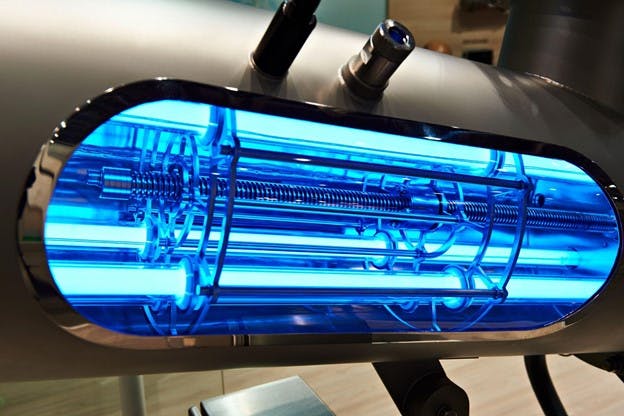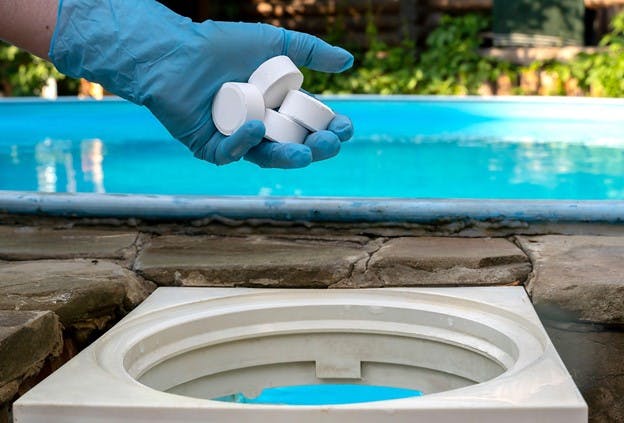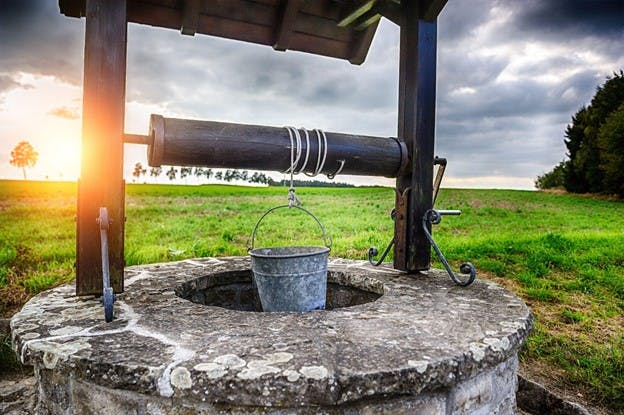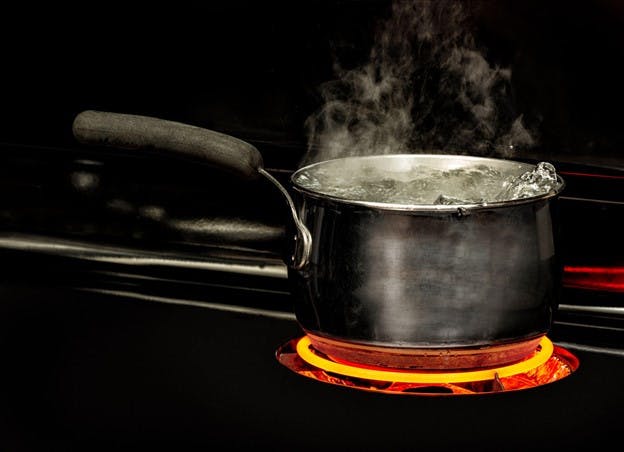🌟 New Arrival! Upgrade Your Water with Our Advanced Pitcher Filter. Shop Now
February 2023
How UV Light Water Treatment Gives You Higher-Quality Drinking Water
A technology even older than any of those though is ultraviolet light from the sun. Ultraviolet light is a powerful disinfectant. In the same way that UV light can damage your skin cells when you’re overexposed to it, UV light damages the DNA of microorganisms so they can no longer replicate or cause disease.
In this article we want to look at where this natural technology fits into modern water filtration systems. More specifically, we’ll explore whether UV light water treatment will improve your home’s water quality, including UV light for well water.
How Does a UV Water Filter Work?
Water passes through a stainless steel casing. Inside that casing is a UV bulb that’s protected by a clear quartz sleeve. The UV bulb puts out UV-C light at the germicidal wavelength, which is able to pass through the quartz sleeve to penetrate the water flowing around it.
There are censors inside the steel casing to make sure the bulb is putting out enough UV light, and there’s a unit to control the gallons per minute (gpm) that pass through the unit. If the light emitted weakens, the controller may slow the water flow so the water gets more treatment time. Finally, there’s a power supply to make the whole system work.
How Does UV Light Water Treatment Work?
Ultraviolet light disinfects water by inactivating the DNA of microorganisms so they can no longer reproduce. It does this by putting energy into the water that interacts with the microorganisms as they pass around the UV lamp. These UV disinfection systems are effective against a large variety of disease-causing water contaminants like:
- Viruses
- Bacteria
- Cysts
- Coliform
- Salmonella
- Giardia
- E.coli
- Cryptosporidium
- Typhoid Fever
- Flu
- Polio
- Dysentery
- Cholera
- Meningitis
- Infectious Hepatitis
- Covid
Some of these — like cryptosporidium and giardia — are resistant to chlorine and other chemical disinfectants. These two parasites in particular are very common in U.S. public water supplies and they’re very dangerous to immunocompromised individuals.
Most, if not all, annual water quality reports put out by city water suppliers include a warning to immunocompromised people recommending that they talk to their doctor before consuming tap water due to the presence of cryptosporidium and giardia. UV sterilizers take care of these microbiological dangers and leave you with clean water.
What Won’t a UV Light Water Treatment Do?
Ultraviolet water purification won’t physically remove anything from your water like a sediment filter will. Ultraviolet light is not a filter in the sense that a filter captures particles and removes them. Instead, a UV water purifier only disinfects the water by killing pathogens and microorganisms before they get to your faucet.
The results of using UV light water treatment is closer to that of using chlorine than a physical filter. There are some key differences though.
What’s the Difference Between UV Light Treatment and Chemical Treatment?
Chlorine has other disadvantages too. Many people don’t like the swimming pool-like taste or smell of chlorine. Plus, it tends to dry out hair and skin.
Finally, even though the low levels of chlorine used to treat water are deemed safe to consume by the U.S. Environmental Protection Agency (EPA), when chlorine interacts with organic matter it creates disinfection byproducts that are carcinogenic in high enough doses over a long enough time period.
The amount of these byproducts that end up in your tap water can change based on the level of contaminants in the source water, how much chlorine is added, and the temperature of the water. Warmer temperatures encourage higher production of these dangerous byproducts.
UV light doesn’t create these byproducts. However, UV light can be thwarted by turbidity in the water. If water has floating sediment particles, they can block or deflect the UV light, allowing some pathogens to slip by. When chemical and UV purification methods are combined, municipalities can lower the amount of chlorine they use while still making sure they kill enough pathogens to keep customers safe.
If you have a private well, the same principles are true.
Should You Get a UV Light for Well Water?
Some of the biggest water treatment plants in the world — like the one in NYC that provides 1.2 billion gallons of drinking water per day — use ultraviolet light to treat water.
If you’re using a private well, the only treatment that you get is what you do for yourself. For that reason, getting a home filtration system that covers as many bases as possible is something you should certainly consider. When combined with pre-filtration technologies, using UV light for well water can improve the purity of your water.
Is UV Light Water Treatment Safe?
In a time when SPF skin protection is in so many products, many people are concerned about how safe it is to have a UV light in their home. UV treatment systems are regulated by the U.S. EPA. In most cases, the steel casing traps the UV rays inside the unit and directs them only toward your water.
What Is the Disadvantage of Using UV to Disinfect Water?
As a water treatment device there’s no disadvantage to adding a UV water sterilizer to an under-sink or whole-house water filter system. It’s an added layer of protection for your water that is safe, environmentally friendly, and chemical-free.
If you intend to use it by itself, it would be an incomplete solution since it wouldn’t filter out sediment, heavy metals, chlorine, or other harmful chemicals.
There are a few other downsides, like added cost. Not only do you need to purchase the UV water purification system but you also need to consider that it's going to cost you a little bit in electricity.
You’ll also need to replace the light bulb about once per year. While changing a UV bulb isn’t complicated or messy, a chore is a chore even if it is just once per year.
How Much UV Light for Well Water Is Needed to Purify Water?
Most UV water disinfection systems are built to apply a germicidal dose of 30 mJ/cm2 (30 millijoules divided by centimeters squared) of energy to your well water. This is strong enough to be effective against all microorganisms commonly found in water supplies. If you suspect you have a special case, water testing would be in order.
The dose applied by a UV water treatment system is calculated by multiplying the UV intensity by the amount of time the water is exposed to the UV unit of energy. A system that has a higher flow rate will need to put out more energy in order to apply the minimum effective dosage to your water.
The VIQUA system available in our store has UV sensors to ensure you’re always getting an effective dosage. If it drops below, the system will alert you and slow the water flow.
How Does UV Light Affect Water?
UV light doesn’t affect water. It only affects the organisms in the water. As light energy passes through the water, it’s absorbed by the microbes in the water. Everything not absorbed by the microbes just passes through the water and is gone. The H2O will remain simple H2O.
Which Is Better: Reverse Osmosis or a UV System?
Reverse osmosis systems and UV systems are both water treatment solutions but they work in very different ways and provide different benefits.
Ultraviolet light kills microbes in your water while the reverse osmosis system is a physical barrier which traps very small contaminants. For general purposes, if you were going to choose just one, a reverse osmosis system filters out a wider array of impurities from your water. Adding a UV light to an existing water filtration system gives you added protection and peace of mind.
Does a UV Light Go Before or After the Filter?
Ideally, you would pre-filter the water before sending it under the UV light. Any floating sediment in the water could block the UV rays and allow microorganisms to skate by unharmed. If you have hard water — meaning your water has a lot of mineral solids in it — a water softener could help to make your UV system even more effective.
Does a UV Water Filter Remove Chlorine?
Chlorine isn’t removed by a UV light but it could allow less chlorine to be added in the treatment process, and that’s just as good.
If you have chlorine in your water you’d like to get rid of, consider adding an activated charcoal filter, a reverse osmosis system, or a filter with KDF media to your house. All HomeWater whole-house, under-sink, shower head, and countertop filters remove chlorine.
Is UV Better Than Boiling Water?
Direct UV light and water boiling accomplish similar things. They both kill microorganisms that could otherwise make you acutely sick. Which one is better depends on your situation. If you have clear water with no turbidity, a UV light will probably work better. If the water has a lot of floating debris that could block the light, boiling might be the better way to go.
In most circumstances, a UV sterilizer is the better option because water just needs to pass under the light briefly. Boiling takes far more effort, is done in smaller batches, and for most applications, you need to wait for it to cool. All of these factors make it a less-practical choice for day-to-day water needs.
Ultraviolet Disinfection Brings Clean Water Into Your Home
There’s no technology older and more proven than the sun. UV rays mimic sunbeams to disinfect your water in a safe and environmentally friendly way. UV light water treatment increases your water quality whether it’s from a public water source or if you’re using UV light for well water.
If you want the best quality water possible, consider adding a VIQUA ultraviolet light water disinfection system to our whole-house 4-stage water filter. HomeWater’s American-made, high-flow filtration systems give you clean, great tasting water in every sip, and they’re even better with VIQUA disinfection systems.
Related Articles
January 2023
How to Find the Best Water Purifier for Home Use
October 2022



